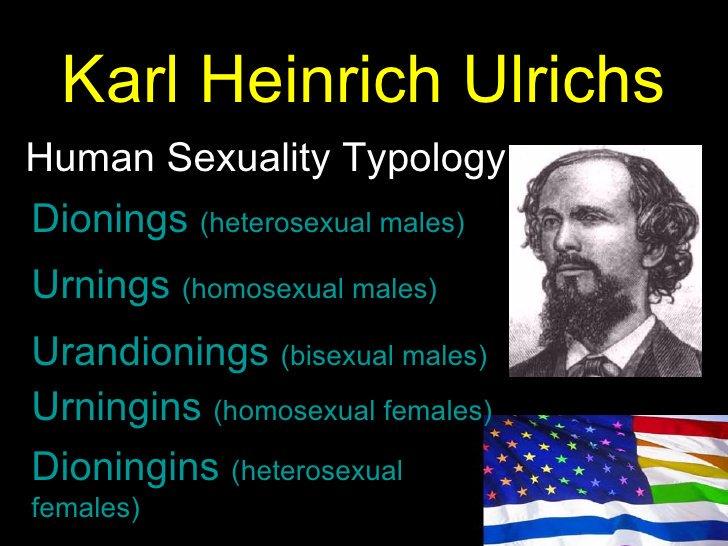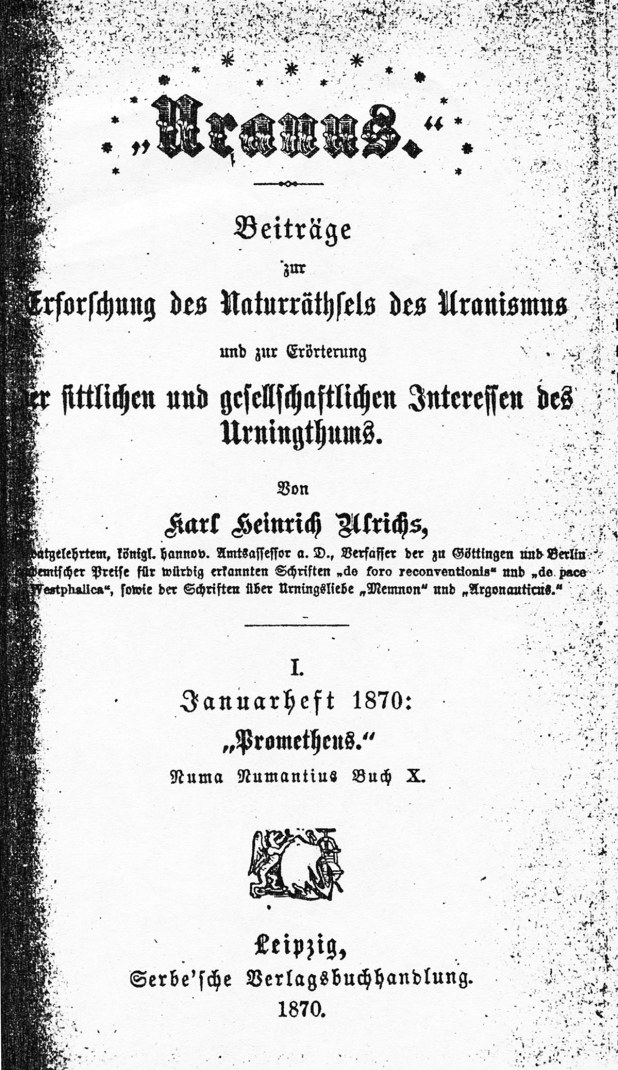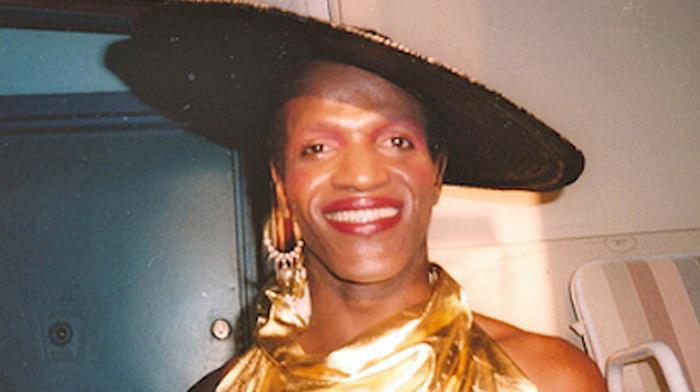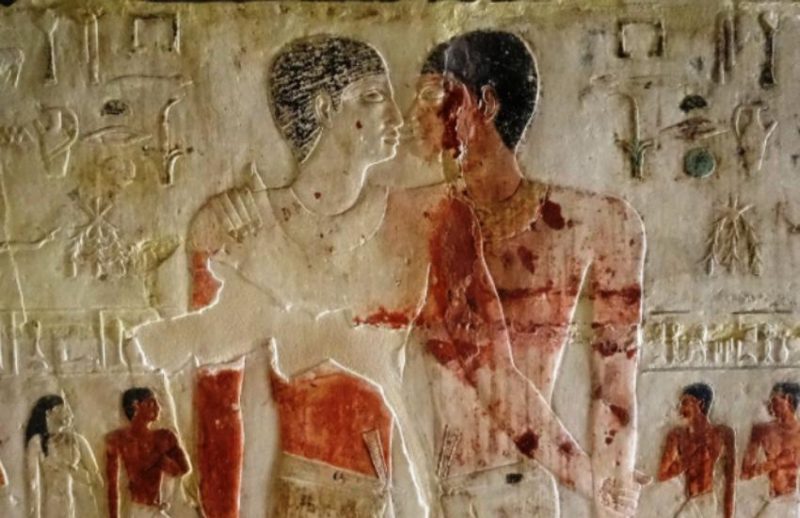Key Date For Lesbian, Gay, Bi and Trans equality (LGBT activism, started by Ulrichs 150 years ago)
Share

LGBT history dates back to the first recorded instances of same-sex love and sexuality of ancient civilizations, involving the history of lesbian, gay, bisexual, transsexual, and transgender (LGBT) peoples and cultures around the world. What survives after many centuries of persecution—resulting in shame, suppression, and secrecy—has only in more recent decades been pursued and interwoven into more mainstream historical narratives. From Wikipedia, the free encyclopedia
Over the 29 August, 1867 LGBTI activism was created whenever a journalist and jurist publicly arrived and challenged the German Confederation to decriminalise anti-sodomy laws.
This act, a 150 years back, was a courageous and defining moment that would change our understanding of sexuality and human rights forever. But how do we arrive to the moment? Who was this exceptional man?
Karl Heinrich Ulrichs was his name and he, in effect, is the daddy of LGBTI activism and the first modern gay man.
Ulrichs laid down the paradigm for the present day LGBTI movement, getting in touch with for repealing all sodomy criminalisation and the rights for relationship, family, adoption, expression and anti-discrimination. In a way his work is the corner stone for 150 years of equality activism. His works became the building blocks for queer, gender rights activists as well as civil liberities actions.
Karl Heinrich Ulrichs was created on 28 August, 1825 Westerfeld, a part of the Kingdom of Hanover, later to participate Germany.
His first observations regarding sexuality were about his own character, recalling he became aware of his first same-sex attraction at age 9, and his first homosexual experience was at age 14, in the course of a brief affair along with his riding instructor.
Ulrichs’s accomplishments were immense, he published the first scientific theory of sexuality altogether, which saw same-sex desire as natural, and correspondingly he demanded it should be legal.
He graduated in legislation and theology from Göttingen University or college in 1846. From 1846 to 1848, he studied background at Berlin College or university, writing a dissertation in Latin on the Peacefulness of Westphalia.
From 1849 to 1857 Ulrichs worked as an official legal adviser for the area courtroom of Hildesheim in the Kingdom of Hanover. He was dismissed when his homosexuality became open knowledge.
In 1862, Ulrichs took decided to come out to his relatives and buddies, who despite being religious, accepted and did not rejected him. Regarding to his diaries, however, he still didn’t reach a name for someone who experiences same-sex desire.
After developing, he made a decision to explain the nature of his sexuality, at that time same-sex desire had no name of its to denote an inherent nature or person, instead it was dismissed as a “discovered” vice and a sin. He therefore embarked on detailing and exploring the issues, writing under the pseudonym of “Numa Numantius” he, in 1864, initially wrote two booklets, which soon grew to five, collectively known as his ‘Researches on the Riddle of love between Men,’ eventually he released twelve volumes on the decade.
In these writings Ulrichs submit two groundbreaking ideas about sexuality, that would forever change what sort of world thinks about LGBTI people. First, he declared that homosexuals were a distinct class of people, innately different from heterosexual people.
In those days there was no word to spell it out this class of people, aside from the pejorative, behaviour-based term “sodomite.” Ulrichs coined the term “urning,” indicating follower or descendant of Uranus. The name is a reference to a passing in Plato’s Symposium, where Pausanias phone calls same-sex love the offspring of the “heavenly Aphrodite,” daughter of Uranus. Ulrichs later added the womanly form “urningin” to define women we have now refer to as lesbians. Heterosexuals, in Ulrichs’s parlance, became “dionings”: descendants of the “common Aphrodite,” child of Zeus by the mortal female Dione. He later revised his theory and explained that individual sexuality was a continuum. Ulrichs also coined words for the feminine counterparts (Urningin and Dioningin), and for bisexuals and intersexual individuals.
Second, Ulrichs submit a theory to take into account the development of intimate orientation. In his first conception of this theory Ulrichs posited the presence of a “third sex” whose character is inborn: basically the theory of “delivered this way”.
In his initial theories human embryo was viewed as having the potential for physical and mental development in either the feminine or the male direction. In most people the intimate development of your body and your brain was concordant: either both were man or both were female. In fetuses destined to be urnings, however, the sex of physical development was man, as the sex of mental development was feminine. They, being neither totally man nor totally feminine, constituted a “third sex.” He later put forward a similar explanation for the foundation of urningins: in them, the sex of physical development was feminine, while that of mental development was male. With this sense he also laid down the first modern foundations for understanding transgender and intersex people. All types of sexualities, to Ulrichs, were natural and inborn and therefore should not be criminilised or viewed as sinful. He also argued against spiritual doctrines, such as those of Saint Paul, who he stated made a mistake in contacting same-sex behavior “against nature”, as they were natural occurrences.
Still later he revised his theories again and showed that urnings saw themselves and behaved in a variety of ways from very masculine to feminine and also were attracted to different types of same-sex partners and could range in their sexual preferences (i.e. active, passive, versatile and so on). He also noticed sexuality as a continuum, much like Kinsey, from heterosexual to bisexual and homosexual.
The booklets led to Ulrichs corresponding with thousands of gays and lesbians from all over Germsany and beyond. He also tried to impact anti-gay politicians and clarify the type of sexuality to them, as well as to doctors and lawyers, he also attempted to intervene in cases where LGBTI individuals were put on trial because of sodomy laws and regulations. Ulrichs even delivered his magazines or Marx and Engles, in the hope that the fathers of communism would be sympathetic, instead his views about equality were declined as perverse and “pedophile”.

The first in support of problem of Uranus (January 1870), intended by Ulrichs as a regular periodical
In 1867 Ulrichs, along with his right lawyer friend August Tewe, made a decision to try and mount a courageous attempt to decriminilise same-sex desire from all German states in Austria. They wrote an answer “that inborn love for individuals of the male sex is usually to be punished under the same conditions under which love of the female sex is punished,” and was presented at the Association of German Jurists, the very best legal fraternity in the German Confederation.
Although the quality was excluded from the agenda, on 29 August 1867, he read out his proposal, despite being shouted down by the audience. He demanded “the revision of the existing materials penal code, especially the final repeal of a particular unlawful paragraph … handed down to us from past centuries.’
“It is fond of abolishing this paragraph of the penal code which discriminates against an innocent class of people.”
In other words, Ulrichs became the first homosexual to speak out publicly in defence of homosexuality. As an activist, Ulrichs was ahead of his time and he fought not only for the equal privileges of homosexuals, also for the rights of ethnic and religious minorities, as well as the rights of women, including unwed mothers and their children.
Ulrichs also launched the first ever LGBTI journal in 1870, but only were able to print one issue, nevertheless it was widely circulated around Europe and beyond and allowed many people to begin recognising their nature and discuss their sexuality.
In 1870 Ulrichs posted “Araxes: a Call to Free the type of the Urning from Penal Regulation” a remarkable document just like modern LGBTI rights movement demands
The Urning (homosexual) is a person and therefore, has inalienable rights. Sexual orientation is the right established naturally, which legislators haven’t any right to outlaw, so long as sex functions are private and between consenting adults, furthermore it cannot persecute or torture Urnings.
The Urning is also a citizen entitled to full civil rights that your state has certain duties to fulfill as well. The state does cannot persecute urnings not treat them beyond your law.
Sadly when Prussia united forcibly the German states it conquered under Kaiser Wilhelm I, its anti-sodomy law, Paragraph 175, was enforced throughout Germany and later used to persecute homosexuals by the Nazis.
Ulrichs continued to fight for LGBTI equality but finally gave up 1879 after repeated arrests and working out of money and being repeatedly fired from jobs because of his sexuality. He then crossed over the Alps, settling in the central Italian town of L’Aquila, where he lived for 12 years until he his death on July 14, 1895.
Despite persecution, imprisonment, discrimination and exile, Ulrichs never regretted his activism, writing:
“Until my dying day I will look back with pride that I came across the courage to come face to face in fight against the spectre which for forever has been injecting poison into me personally and into men of my character. Many have been powered to suicide because almost all their pleasure in life was tainted. Indeed, I am proud that I came across the courage to deal the original blow to the hydra of general public contempt.”
During his lifetime Ulrichs already inspired many other nascent gay intellectuals, even achieving to the Bloomsbury Group in London. Unforunately his ideas were distorted and also used negatively by scientists and doctors to pathologise homosexuality.
His writings also inspired the pioneering German sexologist, Magnus Hirschfeld, who 2 yrs after Ulrichs’ loss of life founded the world’s first homosexual privileges corporation, the Scientific Humanitarian Committee.
10 LGBT ACTIVISTS AND ALLIES WHO CHANGED THE COURSE OF HISTORY by Paper Mag
The 50 weirdest and coolest facts from LGBTI history
Did you know churches blessed gay marriages in the ‘Dark Ages’? Discover more here













Follow US